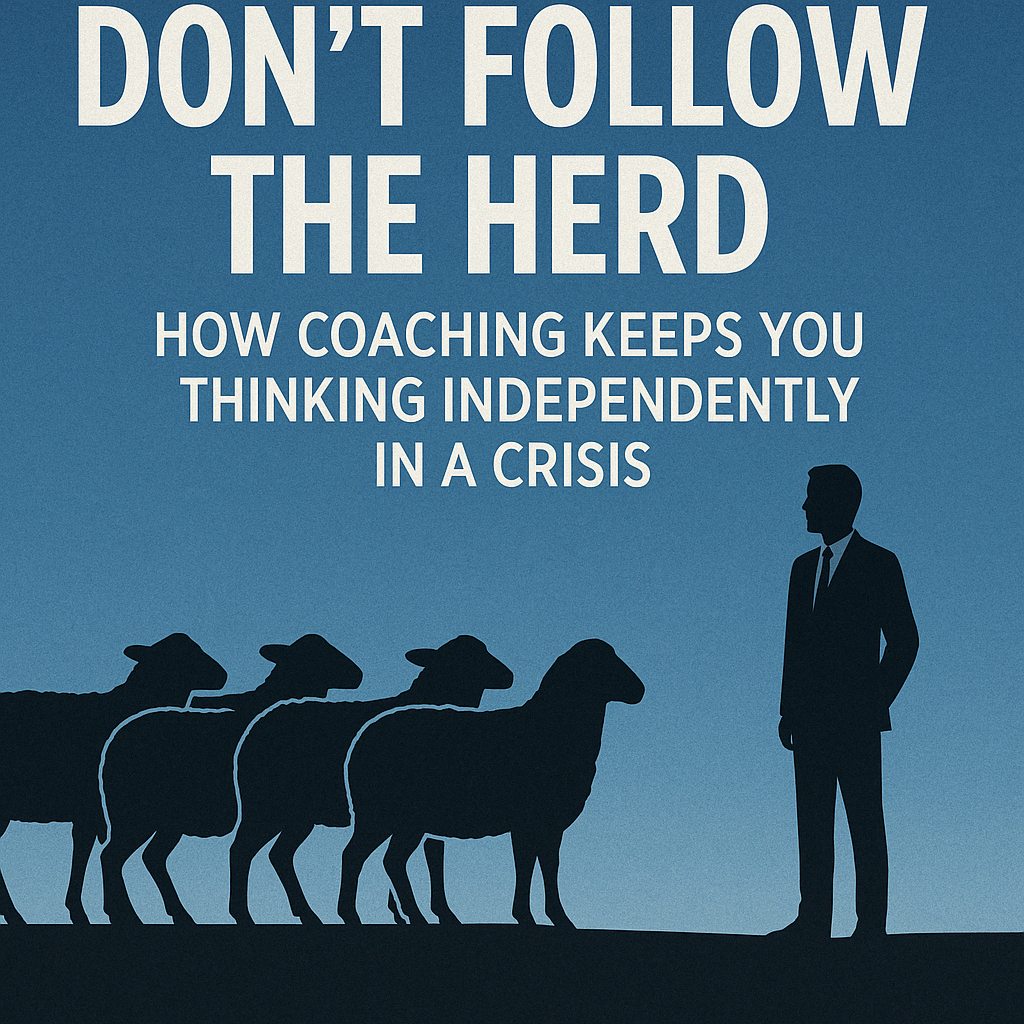Don’t Follow the Herd: How Coaching Keeps You Thinking Independently in a Crisis
In a crisis, thinking independently can make all the difference. Coaching provides the tools to avoid herd mentality, enabling better decisions during tough times. This article will show you how coaching keeps you thinking independently in a crisis—don’t follow the herd: how coaching keeps you thinking independently in a crisis—with insights into developing critical thinking, real-world leadership examples, and practical steps to maintain resilience.
➡️ Ready to break away from the crowd and lead with clarity? Book a free 15-minute coaching call and discover how to think independently in a crisis.
👉 https://calendly.com/joelzimelstern1/15min
Introduction to Independent Thinking
Key Takeaways
- Independent thinking is essential during crises, allowing leaders to make informed decisions rather than following the herd.
- Coaching enhances leaders’ capacity for independent thought by fostering self-awareness, promoting a clear vision, and encouraging risk-taking.
- Building a resilient leadership team requires embracing diversity, encouraging open communication, and cultivating a culture of accountability.
The Importance of Independent Thinking in a Crisis

In times of crisis, the ability to act independently is paramount. Individuals who think independently can adapt, strategize, and navigate challenges effectively, much like those who navigate life without safety nets demonstrate resourcefulness. Smart thinking involves making good choices in the moment, especially when faced with tough decisions during crises. Independent thinking promotes innovative solutions and aids in overcoming challenges efficiently.
On the other hand, herd mentality can lead to poor decision-making, where individuals follow the crowd instead of thinking critically. During a crisis, this can result in missed opportunities and exacerbated problems. Avoiding herd mentality and nurturing independent thinking allows leaders to make well-informed decisions and tackle unpredictable situations successfully. Understanding the entrenched routines and existing mindset within an organization is crucial for implementing effective change.
Herd Mentality vs. Independent Thinking
Since early human beings started following food patterns, our brains have evolved to make decisions based on society cues. This ingrained behavior can lead to a herd mentality, where most people follow the crowd without critical thinking. Herd mentality affects decision-making and leadership by promoting conformity over innovation. During crises, such behavior can result in poor outcomes due to a lack of independent action and critical assessment of the nature of the situation, which can sometimes lead to wrong decisions. This lack of sense can exacerbate the problem, which has led to significant challenges.
Contrastingly, acting independently allows leaders and managers to uncover the truth and foster a competitive mindset. Independent thinking helps leaders make informed decisions, challenge the status quo, and navigate crises effectively. Understanding herd behavior and its impact on leadership enables leaders to strategize and make better decisions independently.
🔍 Feel like you’re caught in the herd? Coaching can help you break free and make smarter decisions. Let’s talk.
📅 Schedule your 15-minute call
Real-World Examples of Independent Leadership
Leaders like Warren Buffett exemplify successful independent decision-making by often going against prevailing market trends. During challenging market conditions, Buffett’s strategic decisions illustrate how rejecting the status quo can lead to substantial success. His ability to think independently and take bold actions demonstrates the importance of independent leadership during crises.
During crises, independent leadership is essential for making bold, unconventional decisions instead of following trends. Faith in one’s own path and decisions is crucial, especially when facing societal pressures and uncertainties. Thinking independently and taking bold moves, as Buffett does, is vital for leaders to navigate crises and drive positive change while moving forward.
These real-world examples show how independent thinking can lead to significant successes and inspire leaders to act independently to succeed during challenging times, providing a reward for their efforts that is well written in reality. What happened during these times serves as a testament to their resilience, as much time was spent overcoming obstacles. Companies have demonstrated this resilience as well, ensuring a brighter future.
💡 What would your business look like if you trusted your instincts like Buffett? Find your independent path—book a discovery call today.
📲 https://calendly.com/joelzimelstern1/15min
Understanding Human Behavior
Human behavior is complex and influenced by various factors, including emotions, experiences, and environment. Understanding human behavior is essential for leaders to make informed decisions and develop effective business strategies. Human beings have a natural tendency to act independently, but they are also influenced by the people around them. The herd mentality can be a significant obstacle to independent thinking, as people often follow the crowd rather than challenging the norm. However, by recognizing and overcoming these obstacles, individuals can develop the skills and knowledge needed to succeed in today’s competitive world. As a coach, it’s essential to identify the strengths and weaknesses of individuals and teams, and provide guidance and support to help them achieve their goals.
How Coaching Enhances Independent Thinking

Coaching significantly enhances independent thinking. It helps individuals make informed decisions that may differ from popular opinion during critical situations, driven by a passion for continuous improvement and performance. Guiding leaders to explore their potential and think critically, coaching helps prevent poor outcomes from collective panic during emergencies.
Personalized coaching enables leaders to explore their own potential as a focused person instead of adhering to established norms. Coaching supports leaders in identifying their strengths and weaknesses, developing a clear vision and strategy for their company, and embracing risks and innovation in the course of their growth. Hope is an essential element in this journey. Crafting a new path involves separating from societal expectations and embracing solitude, which can be a challenging and uncertain process.
Coaching fosters these skills, enabling leaders to navigate crises and make bold, independent decisions that drive success.
🎯 Coaching isn’t about telling you what to do—it’s about helping you think for yourself. Let’s uncover your next move.
💬 Book your 15-minute call
Identifying Personal Strengths and Weaknesses
Regular self-reflection enables leaders to understand their strengths and weaknesses more deeply. Engaging in mindful practices allows leaders to assess their thoughts and decisions, leading to greater self-awareness. Setting aside dedicated time for reflection allows leaders to evaluate their decisions and thought processes, helping them identify their unique abilities.
Identifying personal strengths and weaknesses allows leaders to leverage their unique abilities instead of conforming to group norms. This self-awareness helps leaders act independently and make informed decisions during crises. Understanding one’s strengths and weaknesses is the first step towards leading effectively and navigating challenges with knowledge and confidence.
🧠 Want help identifying what makes you unique as a leader? A coaching call might be the breakthrough you need.
📌 Claim your spot now
Developing a Vision and Strategy
Aligning a clear vision and business strategy with personal values is essential for leaders to proceed confidently. A clear vision helps leaders align their strategic goals with personal values, promoting authenticity in their decision-making. Effective coaching supports leaders in aligning their business strategies with personal values for greater commitment.
A clear vision aligned with personal values helps leaders navigate challenges and make confident decisions. Coaching helps leaders develop this vision and strategy, providing direction and focus for their organizations. This alignment ensures that leaders remain committed to their goals and can lead their teams effectively during crises.
Embracing Risks and Innovation
Leaders who embrace independent thinking often pioneer innovative solutions, turning crises into opportunities. Successful leaders differentiate themselves by making unconventional choices that defy popular opinion. Coaching support enhances leaders’ willingness to take risks and pursue innovation, offering a safe space to explore without fear of failure.
Accountability from a coach encourages leaders to take calculated risk that propel personal and organizational growth. Coaching provides a safety net that fosters innovative thinking and encourages leaders to take responsibility for their actions. By embracing risks and innovation, leaders can achieve substantial success and drive their organizations forward.
Overcoming Obstacles to Independent Thinking
Overcoming obstacles to independent thinking requires a deep understanding of human behavior and the ability to challenge the status quo. It involves developing a growth mindset, being open to learning and exploration, and embracing failure as an opportunity for growth. Most people are afraid to take risks and challenge the norm, but successful leaders know that this is essential for driving innovation and growth. By surrounding themselves with a diverse and talented leadership team, leaders can encourage independent thinking and foster a culture of innovation and experimentation. As the world becomes increasingly complex and interconnected, the ability to think independently and make bold moves will be crucial for companies to stay ahead of the competition.
Building a Resilient Leadership Team

Building a resilient leadership team is essential for navigating crises effectively. Coaching fosters independent thinking by guiding individuals to identify obstacles and explore new perspectives. Leaders should foster an environment that encourages open dialogue to mitigate the risks of herd mentality. Together, coaching that promotes independent thinking and open communication forms the foundation of a resilient leadership team capable of thriving in crises. Successful CEOs might also appoint friends to the board of directors, which can influence leadership dynamics and succession processes.
Diverse perspectives, open communication, and a culture of accountability build a resilient leadership team. By promoting these value, leaders can create an environment where team members feel valued and empowered to make independent decisions.
🚀 Resilient teams start with resilient leaders. Are you developing the mindset to lead from the front? Let’s chat.
📞 https://calendly.com/joelzimelstern1/15min
Promoting Diverse Perspectives
Leadership teams that embrace diversity of backgrounds and experiences tend to foster greater innovation and improved decision-making. Incorporating varied viewpoints can enhance problem-solving and innovation within leadership teams. Utilizing tools like 360-degree feedback allows coaches to gather varied perspectives on an individual’s strengths and weaknesses.
Forums or meetings that encourage diverse input can enhance team creativity and problem-solving capabilities. Promoting diverse perspectives ensures that teams are well-equipped to handle challenges and make informed decisions during crises.
Encouraging Open Communication
An environment of trust and open dialogue enables team members to share ideas and challenge norms. Facilitating open dialogue boosts engagement and ensures all members feel valued in decision-making. Transparent communication within teams fosters trust and collaboration, essential for effective decision-making and providing a clear answer.
Open communication is essential for effective team dynamics and decision-making. By encouraging honest dialogue and creating a safe space for sharing ideas, leaders can inspire and support their teams, leading to better outcomes during crises.
Fostering a Culture of Accountability
Coaching provides a framework within which accountability can thrive, emphasizing the importance of personal responsibility in team dynamics. Coaches instill a mindset of accountability, encouraging leaders to take ownership of their decisions and actions, thus fostering a culture of responsibility. Accountability practices guided by coaches help leaders reflect on their methods and outcomes, promoting a deeper understanding of their impact.
A culture of accountability is cultivated when team members are encouraged by their coaches to take initiative and responsibility for their roles and outputs. Individual accountability fosters shared responsibility, encouraging team members to collaborate towards common goals with integrity and trust.
Critical Thinking and Problem-Solving
Critical thinking and problem-solving are essential skills for independent thinkers. It involves analyzing information, identifying patterns and relationships, and developing creative solutions to complex problems. By applying critical thinking and problem-solving skills, individuals can develop effective business strategies and make informed decisions that drive growth and success. As a leader, it’s essential to encourage critical thinking and problem-solving within your team, and provide the necessary support and resources to help them develop these skills. By doing so, you can create a culture of innovation and experimentation, and stay ahead of the competition in today’s fast-paced business world.
Practical Steps for Leaders to Avoid Herd Mentality

Leaders can cultivate an independent mindset by implementing structured reflection practices. Regular reflection and self-assessment help leaders identify biases and encourage critical thinking about decisions. Seeking out diverse opinions is essential for leaders to challenge the status quo and make informed decisions. Coaching can provide leaders with strategies to actively seek out and embrace diverse perspectives.
Continuous learning and development keep leaders adaptable and innovative. Ongoing education and training enhance leaders’ effectiveness and confidence in navigating crises. These practical steps help leaders maintain independent thinking and avoid the pitfalls of herd mentality, recognizing the intrinsic rewards of personal growth and authenticity.
🔄 Break the cycle of reactive leadership. Let’s explore how you can lead with clarity and confidence during uncertainty.
🔗 Book a coaching session
Regular Reflection and Self-Assessment
Engaging in self-assessment activities can significantly aid individuals in pinpointing their abilities and areas needing improvement. Regular self-reflection helps leaders identify their biases and encourages critical thinking about their decisions. Structured decision-making process helps leaders mitigate herd behavior, leading to better outcomes.
Regular reflection practices foster continuous learning and improve leadership effectiveness. By engaging in self-reflection, leaders can remain aware of their growth and learning trajectory, enhancing their ability to navigate crises effectively.
Seeking Out Diverse Opinions
Seeking out diverse opinions is essential for leaders to challenge the status quo and make informed decisions. Structured decision-making processes can mitigate groupthink. Leaders should regularly invite feedback and foster open dialogue to encourage a culture of diversity in opinions. Coaching can provide leaders with strategies to actively seek out and embrace diverse perspectives.
Leaders should regularly invite feedback and foster open dialogue to encourage a culture of diverse opinions. Valuing diverse perspectives ensures leaders make well-informed decisions that consider multiple viewpoints, leading to better outcomes.
Continuous Learning and Development
Coaching plays a crucial role in enhancing continuous learning and development, allowing leaders to grow and adapt in changing environments. Through personalized sessions, coaches assist leaders in identifying their personal strengths and weaknesses, enabling tailored development strategies. Regular reflection and self-assessment, encouraged by coaches, are vital practices for leaders to remain aware of their growth and learning trajectory. Writing can also serve as a means of self-exploration and individual expression, helping leaders confront their thoughts and insights.
Leaders should actively seek diverse opinions and challenge existing viewpoints, supported by coaching for a richer learning experience. By engaging in continuous learn and development, leaders can enhance their ability to navigate crises and lead their next generation teams effectively.
Navigating Crisis and Change
Navigating crisis and change requires strong leadership and independent thinking. It involves being able to think on your feet, make bold moves, and inspire your team to follow your vision. In times of crisis, it’s essential to stay focused and calm, and to have a clear understanding of the challenges and opportunities that lie ahead. By surrounding yourself with a talented and diverse leadership team, you can develop effective strategies for navigating crisis and change, and emerge stronger and more resilient than ever before. As Warren Buffett once said, “It’s not necessary to do extraordinary things to get extraordinary results.” By applying independent thinking and strong leadership, you can achieve extraordinary results and drive your company forward, even in the most challenging times.
Summary
Independent thinking is crucial for effective leadership during crises. By avoiding herd mentality and fostering independent thinking, leaders can make informed decisions that drive success. Coaching plays a vital role in enhancing independent thinking by helping leaders identify their strengths and weaknesses, develop a clear vision and strategy, and embrace risks and innovation.
Building a resilient leadership team involves promoting diverse perspectives, encouraging open communication, and fostering a culture of accountability. Practical steps for leaders to maintain independent thinking include regular reflection and self-assessment, seeking out diverse opinions, and continuous learning and development. By applying these insights, leaders can navigate crises effectively and drive their organizations forward.
🌱 You’ve read the strategies—now it’s time to apply them. Let’s discuss how you can lead with intention.
🗓️ Schedule your free 15-minute call
Frequently Asked Questions
Why is independent thinking important during a crisis?
Independent thinking is vital during a crisis because it encourages innovative solutions and effective problem-solving. By relying on your own judgment, you can make better decisions instead of succumbing to the herd mentality.
How does coaching enhance independent thinking?
Coaching boosts independent thinking by empowering individuals to recognize their strengths, craft a personal vision, and embrace innovative risks. This personalized support fosters critical thinking and breaks the mold of conformity, leading to greater creativity and self-expression.
What are some practical steps for leaders to avoid herd mentality?
To avoid herd mentality, leaders should deal with challenges by engaging in regular reflection, seeking diverse opinions, and committing to ongoing learning. By doing so, you empower yourself to make informed, independent decisions that truly reflect the best course of action.
How can leaders promote diverse perspectives within their teams?
Leaders can promote diverse perspectives by fostering open dialogue and creating forums for input, which enhance problem-solving and innovation. Embracing varied viewpoints will not only strengthen your team but also drive success!
What is the role of accountability in building a resilient leadership team?
Accountability is essential for creating a resilient leadership team because it nurtures personal responsibility and integrity, ultimately enhancing team dynamics and performance. Embracing accountability transforms leaders, empowering them to own their decisions and drive collective success.



